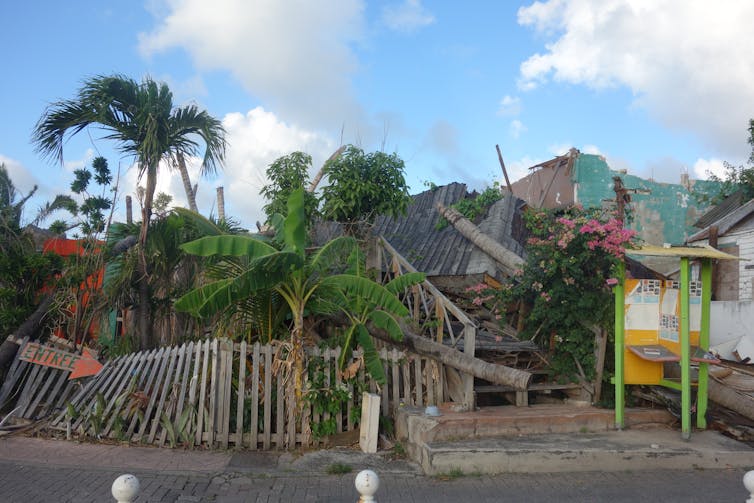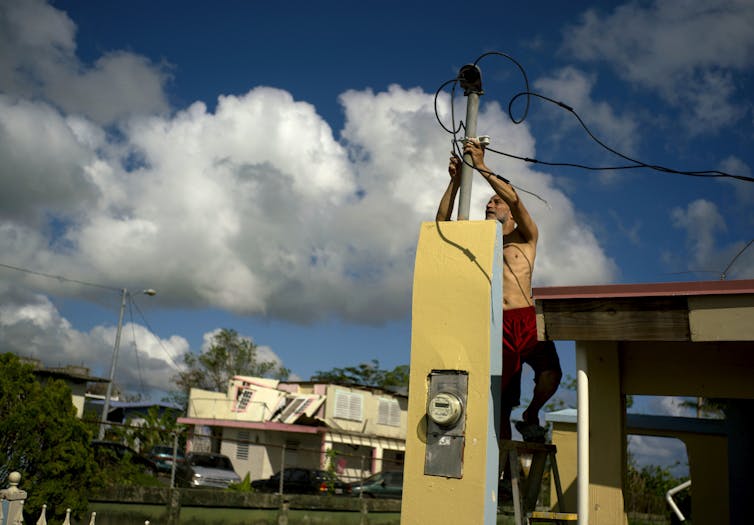How corruption slows disaster recovery
- Written by Juliet S. Sorensen, Harry R. Horrow Professor in International Law, Northwestern University
The 2018 hurricane season has now begun[1]. It’s a good time to think about lessons learned from last year’s historic storms.
Hurricane Irma, which raged across the Caribbean from late August to early September 2017, was the strongest[2] Atlantic hurricane since record keeping began in 1851.
In total last year, six major storms were Category 3 or greater, making 2017 the seventh[3] most-active year in history and the costliest[4] ever.
The Center for Disaster Management and Risk Reduction Technology, a German research institute, estimates[5] that reconstruction on the islands hit by Irma alone will cost at least US$10 billion.
But having recently completed a monthslong human rights analysis[6] on the aftermath of last year’s deadly hurricane season, we believe that’s a low estimate. Our research identified another cost contributing to the challenges of rebuilding: corruption.
Devastation in Sint Maarten
We visited the Caribbean island of Sint Maarten, which is part of the Netherlands, in February. Hurricane Irma’s destruction was still apparent.
Massive trees had been ripped out of the ground and toppled, their roots exposed. Vehicles and debris were scattered across the landscape. Marinas, a key infrastructure for this 14-square-mile island, were left in ruins, littered with the stranded remnants of boats that had smashed onto shore.
 Sint Maarten, five months after Hurricane Irma.
Juliet Sorensen, Author provided (No reuse)
Sint Maarten, five months after Hurricane Irma.
Juliet Sorensen, Author provided (No reuse)
Amid such chaos, cleanup and rebuilding after an extreme weather event becomes urgent. And urgency, we found, breeds opportunities for corruption.
Government malfeasance is already prevalent[7] in Sint Maarten, which has relatively lax regulation and a cash-fueled economy driven by tourism and casinos[8]. The influx of reconstruction funds[9] after Hurricane Irma created new opportunities for graft.
Local authorities told us, for example, that the initial days of debris clean-up in Sint Maarten involved over 1,000 workers, paid hourly, but only eight supervisors. Our interviews indicate that the scant oversight enabled fraudulent inflation of reported hours, wasting vital government funds on work left undone.
The Dutch government, which offered Sint Maarten $641 million in relief after Hurricane Irma, was concerned enough about misappropriation that it insisted on certain anti-corruption safeguards[10]. They included establishing an “integrity chamber” to receive and investigate complaints about corruption on the island.
Sint Maarten’s prime minister refused to accept the funds under such conditions and, in November, resigned in the ensuing scandal[11].
Eventually, Sint Maarten’s government bowed to Dutch demands. The first installment of relief funding, managed by the World Bank[12], was released to the island in April, seven months after the hurricane devastated the island.
Corruption kills
Corruption in Puerto Rico may have actually contributed Hurricane Maria’s high death toll. While the government’s official tally is 64 storm-related deaths, a recent study[13] puts the figure closer to 4,600 – in part because a prolonged blackout prevented[14] many Puerto Ricans with chronic illness from getting necessary medical care.
After Hurricane Maria knocked out the island’s electric grid, the island’s power authority awarded a $300 million contract[15] to the Montana-based company Whitefish Energy to repair it. The bidding process soon came under suspicion[16] because it was clear that the company, which had just two employees, could never complete the task.
 A Puerto Rico resident tries to reconnect his own electricity after Hurricane Maria.
AP Photo/Ramon Espinosa
A Puerto Rico resident tries to reconnect his own electricity after Hurricane Maria.
AP Photo/Ramon Espinosa
The U.S. House Committee on Natural Resources opened[17] an investigation and the Whitefish contract was canceled[18].
After $3.8 billion in federal aid for the power grid, some 11,000 Puerto Ricans are still without electricity[19]. Officials say[20] even a mild hurricane could disable the grid again.
We believe progress would have been quicker if Puerto Rico’s first big energy contract had been correctly executed. After a disaster, corruption can literally kill[21].
Unaccountable donors
In the Caribbean, a developing region where some governments may be too small and cash-strapped[22] to lead a wholesale recovery effort, corruption after natural disasters may be compounded by a lack of transparency among the international donors and humanitarian organizations[23] that rush in to help.
After Haiti’s 2010 earthquake, for example, an unprecedented[24] $13.5 billion in aid money flowed onto the island – more than double[25] its gross domestic product.
Much of this money never made it to those who needed it. A 2011 study by U.S. researchers found[26] that only 44 percent of Haitians affected by the quake received any aid at all.
According to a comprehensive analysis[27] by the Center for Global Development, Haiti’s government received just 1 percent of humanitarian aid and perhaps 15 to 20 percent of longer-term relief aid. The rest was channeled to charities and nongovernmental organizations, whose resulting projects were in many cases impossible to identify.
Time to get ready
The United Nations, which also offers valuable guidance on fighting corruption in its 2005 Convention Against Corruption[28], will soon launch an anti-corruption initiative[29] offering tools catered toward small island developing states like those in the Caribbean.
Our work also identified several ways that Caribbean countries could limit how corruption harms future hurricane recoveries.
Better disaster preparedness – including building code compliance, zoning enforcement in exposed locations like beaches and hillsides and transparent, well-resourced disaster-response teams – would reduce[30] turmoil after extreme weather. That, in turn, would minimize opportunities for the kinds of chaos-related corruption we documented across the Caribbean.
Island nations might also consider banding together for the purpose of receiving, dispersing and tracking relief funds[31], as Indian Ocean nations did after the region’s 2004 tsunami.
The European Commission created a similar task force in 2013. Today, European countries aren’t left scrambling to respond when disaster strikes. Instead, the Emergency Response Coordination Center[32] monitors the disaster, continually poised to offer expertise, relief funding and first responders as needed across the continent.
Scientists predict[33] that hurricane activity this year will likely be above average due to climate change[34]. For the Caribbean, preparing for extreme weather means being ready for the human-made disasters that can follow it, too.
References
- ^ has now begun (theconversation.com)
- ^ strongest (www.newyorker.com)
- ^ seventh (www.noaa.gov)
- ^ costliest (www.bloomberg.com)
- ^ estimates (www.cedim.de)
- ^ human rights analysis (urldefense.proofpoint.com)
- ^ prevalent (www.worldcasinodirectory.com)
- ^ casinos (www.worldcasinodirectory.com)
- ^ influx of reconstruction funds (papers.ssrn.com)
- ^ insisted on certain anti-corruption safeguards (www.government.nl)
- ^ resigned in the ensuing scandal (www.dw.com)
- ^ managed by the World Bank (www.worldbank.org)
- ^ study (www.nejm.org)
- ^ prevented (www.nejm.org)
- ^ $300 million contract (www.washingtonpost.com)
- ^ bidding process soon came under suspicion (www.huffingtonpost.com)
- ^ opened (naturalresources.house.gov)
- ^ canceled (www.fastcompany.com)
- ^ still without electricity (www.independent.co.uk)
- ^ say (time.com)
- ^ corruption can literally kill (www.nature.com)
- ^ small and cash-strapped (www.imf.org)
- ^ international donors and humanitarian organizations (www.bbc.com)
- ^ unprecedented (www.npr.org)
- ^ double (onlinelibrary.wiley.com)
- ^ found (onlinelibrary.wiley.com)
- ^ analysis (www.cgdev.org)
- ^ Convention Against Corruption (www.unodc.org)
- ^ anti-corruption initiative (sdg.iisd.org)
- ^ reduce (www.brookings.edu)
- ^ receiving, dispersing and tracking relief funds (www.transparency.org)
- ^ Emergency Response Coordination Center (ec.europa.eu)
- ^ predict (www.noaa.gov)
- ^ due to climate change (nca2014.globalchange.gov)
Authors: Juliet S. Sorensen, Harry R. Horrow Professor in International Law, Northwestern University
Read more http://theconversation.com/how-corruption-slows-disaster-recovery-96832

